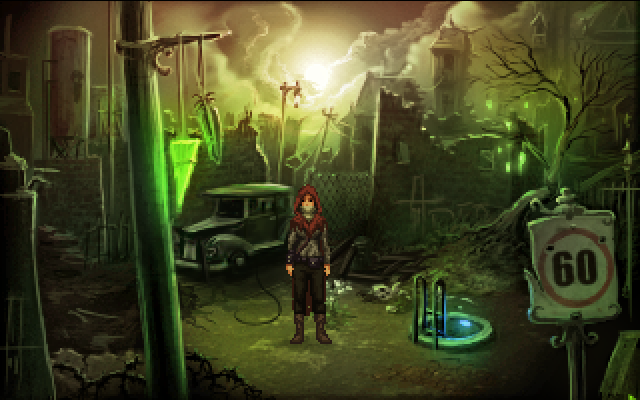Trending
Opinion: How will Project 2025 impact game developers?
The Heritage Foundation's manifesto for the possible next administration could do great harm to many, including large portions of the game development community.
Francisco Gonzalez and Ben Chandler discuss their point-and-click adventure, which is set in a bleak future that is plagued by a deadly disease.

Shardlight, the latest title published by Wadjet Eye Games, is a point-and-click adventure set in a bleak future that is plagued by a deadly disease. The story is about a young woman named Amy Wellard, a mechanic who contracted the plague and must find a vaccine for it to stay alive.
A brainchild of both Francisco Gonzalez and Ben Chandler, Shardlight was originally supposed to be set during medieval times and focusing on the Black Plague. But after some thought, the idea evolved into a post-apocalyptic setting where a disease is slowly killing the infected, and not much hope is left for the surviving population.
Gonzalez cites films and books like Children of Men, V for Vendetta, and The Hunger Games as some of his inspirations for Shardlight. Arkane Studio and Bethesda Softworks’ Dishonored played an influential role too.

Fans might recall a small Shardlight precursor project by the pair which was released back in 2013, featuring the familiar aesthetic and stylings. Called The Rebirth/The Reaper, Gonzalez says that the teaser game was created for an AGS (Adventure Game Studio) community competition.
Aptly titled “One Room One Week,” the competition invites developers to spend one week creating a game that takes place in only one room. “The idea for Shardlight had already been developed at that point, and the basic story was already written,” says Gonzalez. “We decided that the competition was a great opportunity to do something fun and get a feel of the world.”
“Ben had already started coming up with the visual style for the game," he adds, "so we decided to make a little teaser game in the world of Shardlight to prepare people for the world we’re building.”

Usually when Gonzalez designs a puzzle he thinks about how it plays into the story, and what a reasonable obstacle would be at that point. “For me, coming up with the puzzles is the toughest aspect of adventure game design,” notes Gonzalez. “I very much believe in logical puzzles grounded in reality, or true to the game world. As a result, they tend to be on the easy side.”
He says that the most challenging puzzle in Shardlight, the chalkboard puzzle, seems to be pretty divisive. Some people think it’s brilliant, while others think it’s annoying and the solution is too ambiguous.
“We had to leave a number of things on the cutting floor because they weren’t fun,” Gonzalez continues. “For example, there was a section in the Ministry of Medicine where you had to follow a trail by pouring cleaner on the floor and exposing a stain which led you to Central Storage.”
“There was also an extra step in the record player puzzle where you had to find a makeshift turntable,” says Gonzalez. “The solution was to take a pie from the farm, but there was no way to make that seem logical or justifiable, so it was removed entirely.”

The commentary feature has been a fan-favorite since the very first time it was employed in The Shivah, the first adventure title released by Dave Gilbert’s Wadjet Eye Games label. For Shardlight, the entire team would go through the game and make a list of things they think people would be interested in hearing about.
“They were usually things about how an idea came up, or how something was coded, or maybe some subtext in a conversation that isn’t super obvious,” says Gonzalez. “There wasn’t really anything that was edited out. Everything we recorded made it into the game.”
Even using the AGS engine to create Shardlight was challenging at times, and not only because of how good the team wanted the game to look. “The initial version of AGS that the game was compiled in didn’t support alpha blending for character portraits,” Gonzalez muses. “As a result, they all had a strange pixelly halo around them, so we had to work up a separate GUI for portraits.”
“For each portrait sprite, we had to import a blank dummy sprite and edit the sprite number so it would display properly,” continues Gonzalez. “Thankfully, this issue has since been fixed.”

Gilbert's upcoming project Unavowed
Shardlight was released just last month, and Gonzalez is already working on his next project. He's currently designing a steampunk-ish detective game set in an alternate Victorian past, heavily influenced by the works of Edgar Allan Poe and Charles Dickens.
“There will be multiple cases within the game, and each one will have multiple levels of solution, meaning you can range from finding all of the clues and solving them, or completely miss everything and have to declare the case unsolved,” says Gonzalez.
Meanwhile Chandler is hard at work with Gilbert on a new game called Unavowed. “It’s urban fantasy in New York City, much like Blackwell, but perhaps a little closer in tone to something like Vampire the Masquerade,” notes Chandler. “It’s the first real project for me at a resolution higher than 320x240, which I finally feel ready to try after years of hesitating.”
“I’ve wanted to do graphics for a narrative like this for years, so it’s a very satisfying project for me,” he concludes.
You May Also Like